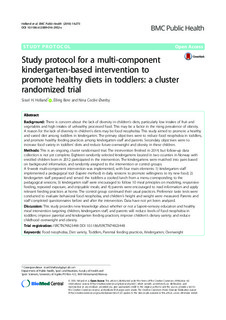| dc.description.abstract | Background: There is concern about the lack of diversity in children’s diets, particularly low intakes of fruit and vegetables and high intakes of unhealthy processed food. This may be a factor in the rising prevalence of obesity. A reason for the lack of diversity in children’s diets may be food neophobia. This study aimed to promote a healthy and varied diet among toddlers in kindergarten. The primary objectives were to reduce food neophobia in toddlers, and promote healthy feeding practices among kindergarten staff and parents. Secondary objectives were to increase food variety in toddlers’ diets and reduce future overweight and obesity in these children.
Methods: This is an ongoing, cluster randomized trial. The intervention finished in 2014, but follow-up data collection is not yet complete. Eighteen randomly selected kindergartens located in two counties in Norway with enrolled children born in 2012 participated in the intervention. The kindergartens were matched into pairs based on background information, and randomly assigned to the intervention or control groups.
A 9-week multi-component intervention was implemented, with four main elements: 1) kindergarten staff implemented a pedagogical tool (Sapere method) in daily sessions to promote willingness to try new food; 2) kindergarten staff prepared and served the toddlers a cooked lunch from a menu corresponding to the pedagogical sessions; 3) kindergarten staff were encouraged to follow 10 meal principles on modeling, responsive feeding, repeated exposure, and enjoyable meals; and 4) parents were encouraged to read information and apply relevant feeding practices at home. The control group continued their usual practices. Preference taste tests were conducted to evaluate behavioral food neophobia, and children’s height and weight were measured. Parents and staff completed questionnaires before and after the intervention. Data have not yet been analyzed.
Discussion: This study provides new knowledge about whether or not a Sapere-sensory education and healthy meal intervention targeting children, kindergarten staff, and parents will: reduce levels of food neophobia in toddlers; improve parental and kindergarten feeding practices; improve children’s dietary variety; and reduce childhood overweight and obesity.
Trial registration: ISRCTN74823448 DOI 10.1186/ISRCTN74823448
Keywords: Food neophobia, Diet variety, Toddlers, Parental feeding practices, Kindergarten, Overweight | nb_NO |

